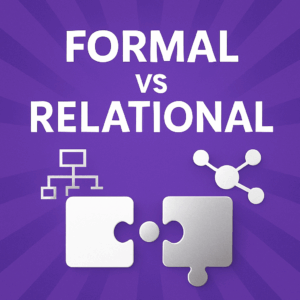The Importance of Contracting: Formal vs Relational

Formal vs Relational Contracting
Every coaching, mentoring and supervision relationship rests on the foundations of clarity, trust and mutual understanding. At the heart of that foundation lies contracting – the process through which the coach, mentor or supervisor and their client, co-design how they will partner together.
Both International Coaching Federation (ICF) and European Mentoring and Coaching Council (EMCC) have specific competency groups as guidence, for example:
EMCC Competency 3: Managing the Contract
- Establishes and maintains the expectations and boundaries of the mentoring/coaching contract with the client and, where appropriate, with sponsors.
ICF Competency 3: Establishes and Maintains Agreements
- Partners with the client and relevant stakeholders to create clear agreements about the coaching relationship, process, plans and goals. Establishes agreements for the overall coaching engagement as well as those for each coaching session.
Why does clear, transparent contracting matter so much?
1. Clarity of expectations and alignment.
2. Safety, trust and relationship building.
3. Co-responsibility, co-creation and empowerment.
4. Boundary management and ethical protection.
5. Flexibility and adaptability throughout the relationship.
6. Evaluation, accountability and closure.
We also need to remember that there are two types of contracting: Formal vs Relational
1. The Formal, Written Contract
This is the tangible, documented and signed agreement that captures the essential terms of the engagement: fees, frequency, confidentiality clauses, duration, cancellation policy, data protection, and legalities. The written contract is particularly important for safeguarding clear external boundaries, and ensuring ethical and professional standards are met. It also provides a point of reference if questions or disputes arise.
2. The Relational Contract (Partnership and Way of Working)
Beyond the written document lies the more dynamic and often more impactful ‘living and breathing contract’ – the co-created partnership agreement about ways of working. This includes mutual expectations, the style and tone of the relationship, how we give and receive feedback, how we handle challenge and silence, and how we review and adjust our way of working as the relationship evolves. This type of contracting is about understanding, boundaries, and relationship management – the very things that allow the work to feel safe, creative, and effective.
Both layers matter: the written contract sets the framework and protects against ambiguity, while the relational contract breathes life into the partnership. Effective practitioners attend to both, revisiting and refining them as the coaching, mentoring or supervision journey unfolds.
Contracting is not a box to tick; it is a living, relational process that underpins effective, ethical and evolving partnerships. It aligns intentions, builds safety, and gives space for growth, renegotiation and closure.
If you would like some supervision support on this topic, please reach out to Caroline and visit https://jigsaw.coach/supervision/.

